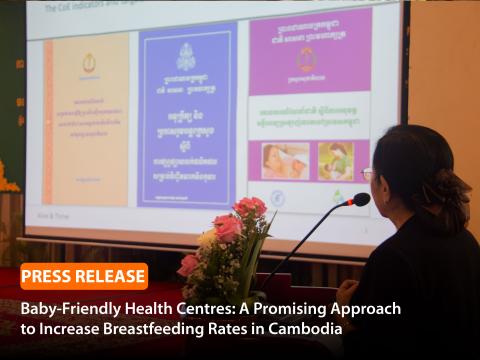Baby-Friendly Health Centres: A promising approach to increase breastfeeding rates in Cambodia

World Vision International in Cambodia, along with Alive& Thrive/FHI 360, equipped eight health centres in Siem Reap Province as Baby-Friendly Health Centres (BFHC) to assess whether the approach had an impact on breastfeeding practices among the women who delivered in those health centres. A key focus was on the impact of early initiation of breastfeeding within one hour of delivery and strengthening other breastfeeding practices to improve the well-being of the newborns and the post-partum mothers.
This study was implemented in close coordination with the National Maternal and Child Health Centre and the Provincial Health Department of Siem Reap. The capacity of the midwives in the target Health Centres improved over the one-year duration of the study, primarily due to the training and supervision visits that focused on breastfeeding promotion; as well as follow-up coaching visits conducted by the Provincial Health Department and the National Maternal and Child Health Centre.
Breastfeeding experiences among the mothers who delivered in these health centres before and after the intervention were recorded and it was found that mothers had positive breastfeeding experiences, received better support from the Health Centre staff for breastfeeding and were well informed about breastfeeding.
Pregnant women need to be educated on the benefits of breastfeeding to prioritise breastfeeding once they deliver. The percentage of mothers who reported receiving information on the benefits of breastfeeding during their pregnancy increased from 83.7% before the intervention to 100% at the end of the intervention. Likewise, the percentage of mothers who delivered their newborns at the health centres and received counselling on the importance of breastfeeding also increased from 77.6% before the study to 100% at the end of the study. Early initiation of breastfeeding, within one hour of birth, can protect the newborns from infections and reduce deaths among newborns. It creates an emotional bond between mother and baby. Initiation of breastfeeding within one hour of birth increased from 81.7% before the study to 98% at the end of the study. 100% of newborns were given only breastmilk during their stay in the Health Centres at the end of the study.
“It is important to breastfeed newborns based on feeding cues so that babies are fed on demand and it can help newborns gain weight appropriately,” said Sedtha Chin, Senior Programme Manager of Alive & Thrive. At the start of the study, only 68.8% of the mothers mentioned receiving information on feeding cues, while at the end of the study 100% of the mothers mentioned receiving information on feeding cues to feed their newborns on a timely basis.
When mothers and newborns are discharged from health centres, they need to be informed to come back to the health centre if they face any challenges with breastfeeding. At the start of the study, only 45.8% of the mothers mentioned the follow-up support post-discharge; however, at endline, this number increased to 100%.
The Baby Friendly Health Centre (BFHC) approach follows the 10 steps of the global Baby Friendly Hospital Initiative (BFHI) led by UNICEF and WHO to promote and support breastfeeding practices. These steps include educating the staff, encouraging skin-to-skin contact after birth, providing breastfeeding guidance to mothers and families, and ensuring mothers have uninterrupted access to their babies for rooming-in and feeding on demand. In addition, BFHC discourages the use of formula or other fluids unless medically necessary and discourages the use of bottles, teats and pacifiers. The last step of the BFHC is to ensure that mothers have continued support for breastfeeding after discharge.
“I feel it is important to have this kind of hands-on guidance including holding, positioning, and good attachment that is required for proper breastfeeding. I am interested in sharing my positive experience with other mothers and helping them in breastfeeding. I remember the signs on good attachment. I am happy to see how beautiful my baby looks when I breastfeed, it helps me to have a good bonding with the child,” said a post-partum mother at Sarsodom Health Centre.
“The midwives working at this health centre used to give breastmilk substitutes (formula feeding). Since this health centre was covered in this study, they too have changed their practice. When staff change their attitude and behaviours, they are better able to influence the post-partum mothers’ behaviours. Health centre staff themselves, practice breastfeeding and express milk, whilst working at the health centre.”, said Mr. Dara, Char Chouk Health Centre chief.
Between the '90s and early 2000s, Cambodia showed impressive achievement in the percentage of children in Cambodia exclusively breastfed for the first 6 months; however, it later decreased from 74% in 2010 to 51% in 20211 (CDHS). In addition, the country registered low rates of early breastfeeding initiation, with only 54% of new-borns breastfed within 1 hour of birth, even though 98.7% of the births are delivered by skilled birth attendants in Cambodia according to the Cambodia Demographic Health Survey 2021-2022.
“With declining rates of breastfeeding in the country, it is critical for health facilities to re-iterate the importance and benefits of breastfeeding to pregnant women, mothers straight after delivery and their family members, to enable mothers to make the most nutritious choices for their child,” said Grana Pu Selvi, Technical Lead for Integrated Nutrition Programme, World Vision International in Cambodia. She also added that “findings from this pilot study present clear evidence that the Baby-Friendly Health Centre approach contributes to improved breastfeeding rates. Scaling up this approach could have a monumental impact on child nutrition across Cambodia”
Note: - Cambodia has healthcare facilities including 102 referral hospitals (9 national, 25 provincial, 68 district), 1141 health centres, and 107 health posts.